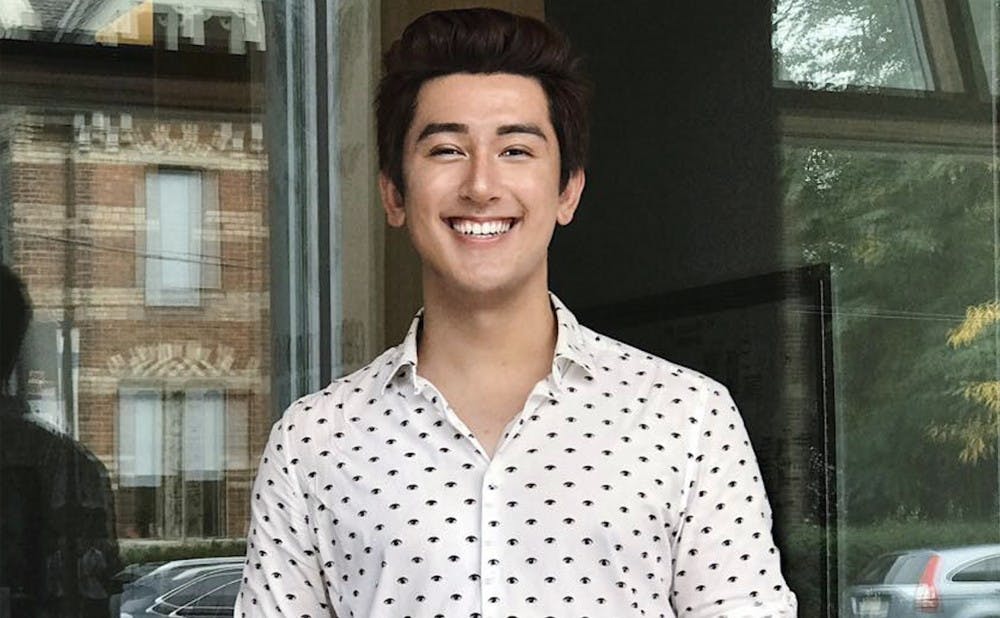Junior Max Bernell was recently selected to be next year's president of Blue Devils United, a student group that advocates for LGBTQ+ students. The Chronicle spoke with Bernell, who currently serves as president of BDU, about his goals for the organization and the LGBTQ+ community on Duke's campus. The interview has been edited for length and clarity.
The Chronicle: Why did you choose to run for president again?
Max Bernell: I was involved with BDU since I was a freshman, and being able to see multiple generations of BDU leadership try different things as well as succeed and fail was one of the biggest reasons. Additionally, I think that I can provide a lot of institutional memory to the younger generation of activists and queer leaders on campus, and I really want to support these leaders and activists through my last year here at Duke.
TC: What do you want to do better next year?
MB: Number one, I want to engage with more advocacy on campus next year. I think now there is more and more momentum—especially after the protests this weekend and all these recent events—so that us throwing our support and continuing to advocate for LGBTQ+ students is going to be increasingly important.
Number two, I want to help facilitate the growth and expansion of LGBTQ+ life on campus. This year we have seen a new group called APIQ, which is Asian Pacific Islander Queers, and they are a niche LGBTQ+ group. I want to use BDU’s privilege—in that we have been here so long and have access to a lot of resources—to help grow and foster groups like this. These groups are what will really help create a more vibrant LGBTQ+ life on campus.
TC: What do you think BDU is struggling with right now?
MB: We are struggling with finding new projects. I think that last year and the years before, we have been continuing [to run] the same projects that we have done in the past. And while preserving tradition is fantastic and amazing, I think there is all of this room to look back and see if any event has run its course. We could also consider if we need to start a new tradition to promote something recent on campus or to start a new initiative to address an issue that has risen on campus.
However, I'm confident that with more involvement from younger generations and from students with all sorts of backgrounds, we will definitely be able to get those ideas out. I also hope to work more with [Duke Student Government] than in previous years. I know that the protest this weekend sparked a lot of engagement from different student groups on campus who really came together as a coalition, and that is something that interests me greatly—advocating for a common good.
TC: How do you think Duke does in comparison to other campuses in terms of creating a safe space for LGBTQ+ students?
MB: I think Duke has been taking good steps in the right direction. I do think that Duke needs to be more firm as well as take stronger and more concrete actions toward making safe spaces on campus. I also think part of this is working with selective living on campus and paying attention to the whole housing reform issue of making queer students feel welcome in all spaces of this university—that’s one huge thing that the University really has the capacity to change.
Other than that, I think representation in faculty is so important. We need more transgender faculty and queer faculty of color so that students can not only look in the LGBTQ+ community for mentorship but also be able to find that from their teachers—this is of critical importance. I know for sure that we are missing transgender individuals and queer individuals of color not only in teaching staff but also in administration and university support. [This] is really important so that these voices are heard in decision making spaces and spaces like Counseling and Psychological Services, so that when queer students of color go in for advising, they really have someone who understands and make them feel safe.
TC: How do you think the LGBTQ+ community fits into Greek life on campus?
MB: That’s a tricky question, I think, and we can see that from several ways. Greek Ally Week has done fantastic things in promoting awareness and safety. However, I think that more steps need to be taken, perhaps by the Greek councils. One important thing could be mandating some form of participation in Greek Ally Week or a form of training for Greek groups on campus so that Greek Ally Week isn’t something that is optional for folks and so that all fraternities and sororities—whether they are for people or IFC or Panhel—are committed to making all students feel welcome in their space.
TC: Where do you see the future of BDU and the fit of LGBTQ+ students within Duke’s community?
MB: I see the future of BDU less so as a centralized hub for all LGBTQ+ life but more so as a supporter and a facillitator of smaller LGBTQ+ groups and initiatives on campus. We want to help facilitate their projects and their smaller issues and provide spaces for those groups to come together and to sit down and generate ideas. We think we can promote more diversity and representation through this method.
Get The Chronicle straight to your inbox
Sign up for our weekly newsletter. Cancel at any time.

